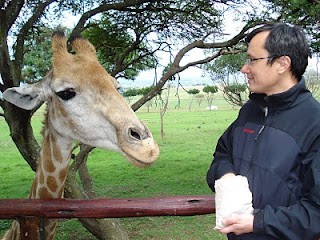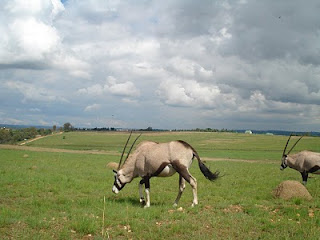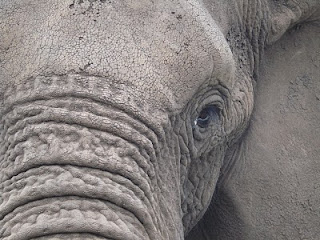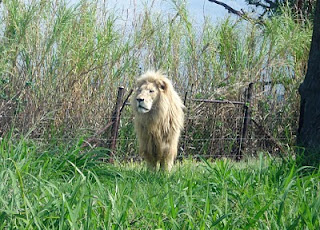

The thing to do in South Africa is see the wild life. National Geographic and the Discovery Channel have scoured the whole of Africa for their progamming. Most of this originates in South Africa, the research, the education, the guides, the languages, the permits etc. It is an industry.
Having watched all these programs on cable, parents choose South Africa as the 'safe' country to bring their kids to get further educated and experience what the world without television and technology is. To show them what real wild animals in real untouched, unfarmed vegetation looks and feels like. In South Africa, one can find a malaria free game lodge to be guided round to see such animals.

If not a safari, there are many zoos - Pretoria which is 1/2 an hour away from Johannesburg has a better zoo than Joburg, apparently, drive through animal parks, places to pet and observe baby lions and giraffes, breeding centres that offer tours, animal sanctuaries, the largest cage in the world (that houses unwanted and rescued exotic bird and monkey species from around the world).

I said earlier that this is now an industry. South African universities leads the world in animal research like how wild animals behave and how to keep them like in the wild, how to breed them etc. I am sure they produce the world's best vets too. Everywhere we see advertisements for Game Lodges.
A South African can invest in opening a eco friendly game lodge. Turn your parents' farm into a game lodge, we'll help you learn how to run a B&B, find and choose the wild animals your grand parents hunted on game auctions, re plant vegetation from wheat to the original species and invite tourists to stay and enjoy a 'real safari experience'. These game lodges offer 2 safari tours a day, all meals included (I doubt its a la carte), a spa with healing therapies, library and full leather furnishings in the public area and english breakfast type bedrooms. You can get your plastic surgery done in Joburg by top surgeons And recover in a game-lodge-spa-healing centre all for the cost of doing the same thing in London.

Their expert breeding techniques allows a visitor to hunt down rare a white lion. The whiteness in a white lion is a product of a recessive gene, but hey, they take better photos dead. In Joburg, I was exposed to the existence of people who like to hunt, in this day. One can pay to hire a gun (I am not sure if you can export your own gun from the US/UK to the SA, though in the airports there are counters for you to surrender your gun before boarding a plane - can they be taken internationally or only regionally?? I do not know.) Anyway, you can hire a gun, a vehicle, a guide (pay extra for someone to recommend an exceptional guide) to hunt a wild animal. Just like they did in the old days when they did it for survival, just like they do in the movies.
Edit 9 Nov 2014 I found this website about canned lions which tells the story about the lion in a petting zoo or safari. They are bred for the hunt and all the money they can suck out of tourists till the day they are killed on the 'hunt'.
Now that's a reality experience holiday - why just head for a beach? The comment I read was, at least in South Africa they breed the lions/zebra for the hunt, not like in Zimbabwe where you get driven to a place in the savannah where the guide has tied the real wild animal to a tree for you to shoot and then taken a picture with.
And what do they do with the dead carcass? Just keep the photo? Replace their grandfathers taxidermied wall hangings in their dining rooms?

We visited a lion park, and depending on when the bred lions have mated and born a baby lion the tourist can get to pet them for 10 minutes. These poor babies, have a stream of American tourists who walk into the cage and touch them. One of these young ones was fast asleep (lions sleep for 18 hours a day, that allows a baby lion to sleep for - how long???) and most approachable. So everyone queued up to take a photo with their hands on his back. Would you like being touched the whole time you are sleeping? Well - Nathan would say yes - he likes a cuddle while he sleeps.. And how do these baby lions grow up? What are their attitudes to humans after this experience? Are these the ones who are bred for the hunt? I guess they will die anyway, so it doesnt matter?
A experienced tour operator mentioned to me. Her opinion of one of the game lodges I was looking at was that it was new and had a lot of local involvement in the management of its safari. But she didnt like the animals there. The wild animals had been brought over from Zambia and Zimbabwe. Their experience of humans was at the other end of a hunt and being killed. Therefore they were more aggressive towards humans if we came too close to them in safari - whether to watch them or accidentally stumble upon them.
Her take was that the wild animals in the Kruger National Park (which is not malaria free and being a National Park allows visitors to enter alone at their own risk and camp) has real wild animals who are more natural and kinder than the other safari park I mentioned. Now, is this kindness or less agression a result of their constant but unthreatened experience with people. How does the experience of people who point camera's at you all day differ from those who point a gun at you affect an animal? Does it make them less wild? I probably have to research the definition of wild and tame and if the meaning has changed over the years.

In starck contrast, we visited the Knysna Elephant sanctuary and took the photos of the elephants on the top. There were no Knysna Elephants in this sanctuary. The Knysna Elephant who is slightly different from the African Elephant was almost completely hunted out by the Europeans and Zulu's who shared the narrow coastline between mountains behind Cape Town - Knysna and the coast for their ivory and . There are 5 elephants who were sighted in 1980. There is better news about the survival of these elephants in this film. Elephants have really bad eyesight, but extremely good sense of smell. This probably helps in forests where one can smell but not see through trees.
These elephants therefore want to and are successful in keeping away from humans.